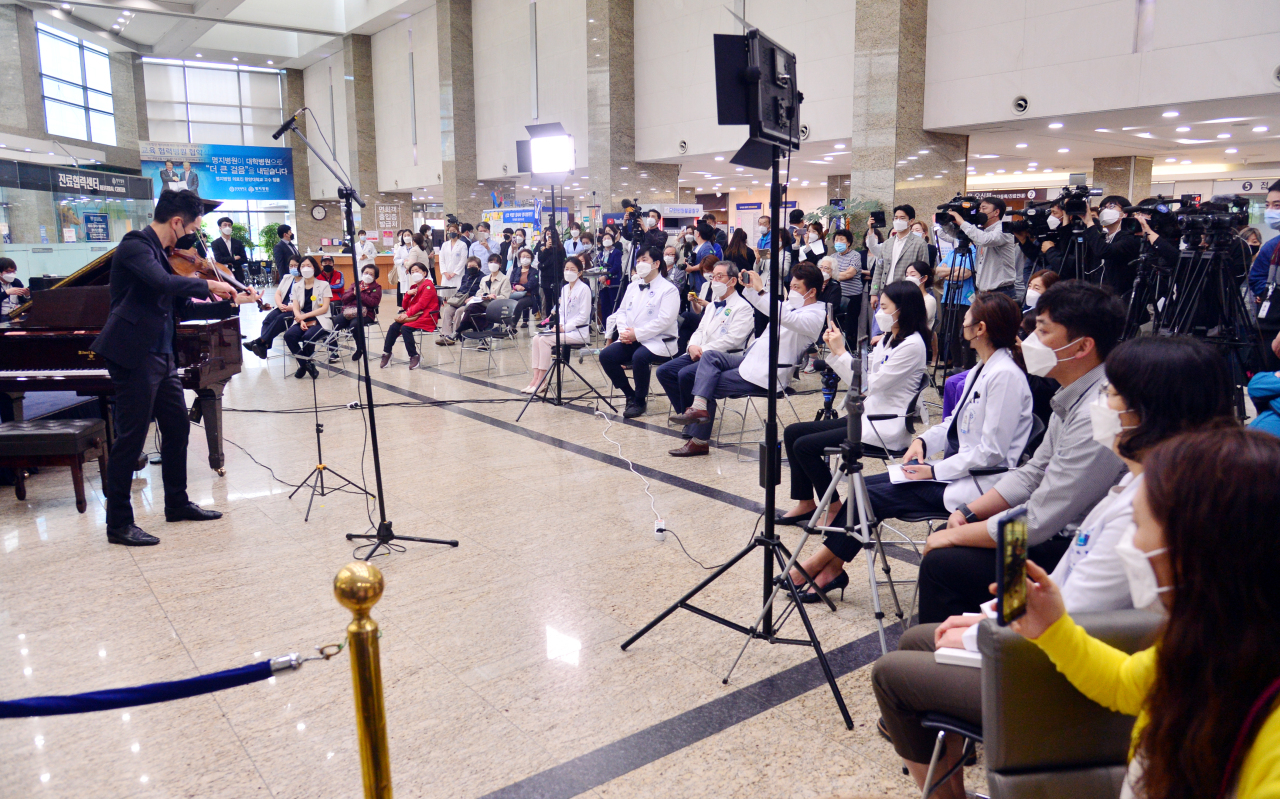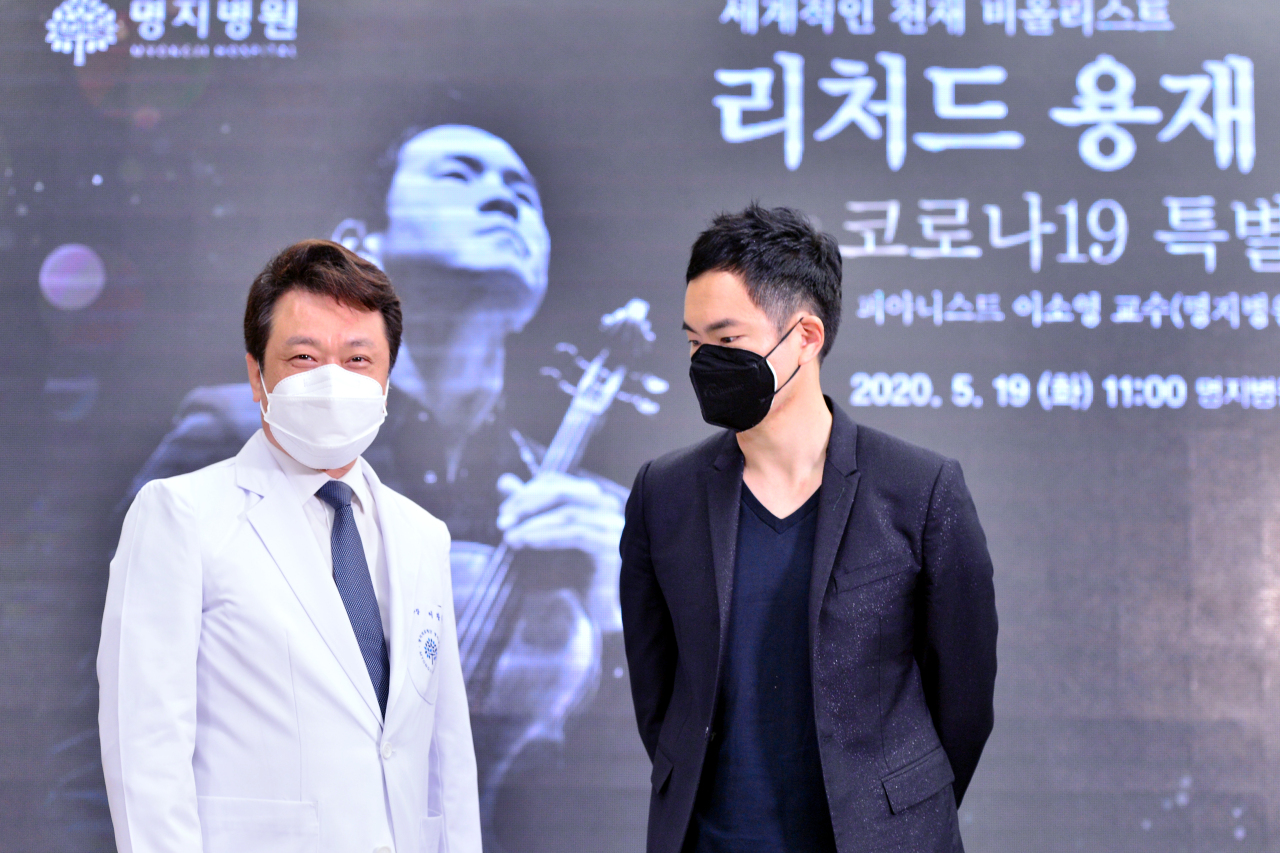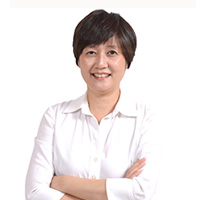Believers in the power of music to heal
Unlikely team of acclaimed violist and hospital CEO come together to stage special concert
By Kim Hoo-ranPublished : May 22, 2020 - 08:52

It had been raining all morning, when violist Richard Yongjae O’Neill stepped into the lobby of Myongji Hospital in Goyang, Gyeonggi Province, Tuesday for a special performance for the hospital’s staff and patients.
The acclaimed violist began the concert with the familiar “Bach’s Air on the G String” from the program, which he designed to be meditative. It was an emotional performance for the musician, for whom this was the first live performance in front of an audience in several months.
Among the audience were the hospital’s corona ward doctors and nurses seated in the “VIP” seats. In the 100 days since Korea’s coronavirus patient No. 3 was admitted to the hospital, two nurses have been infected.
The ding of the elevator, the shuffling of the feet and the sound of wheels on beds transporting patients did not seem to bother the performer or the audience, one grateful for the privilege of playing and the others appreciating the opportunity to hear great music up close.
O’Neill, who flew in from the US for Tuesday’s concert and Friday night’s Seoul Arts Center concert with violinist Yang In-mo, pianist Ilya Rashkovskly and the Ditto Chamber Ensemble, as well as next week’s recital at the Mapo Art Center marking the 15th anniversary of his debut, was in self-isolation for two weeks before the performance.
His viola case, which typically has a few photos of people dear to him, was empty except for his instrument wrapped in an old Hermes scarf. When the absence of photos is pointed out, he says, “This reflects the current state of my mind.”
O’Neill was in New York in March, rehearsing 12-13 hours a day for upcoming engagements, when his world turned upside down with the coronavirus’s onslaught in New York. “Within 24 hours, my slate was wiped clean,” he recalled in an interview with The Korea Herald held after the hospital concert. He canceled everything and took a flight to Los Angeles, where he remained in a shutdown until his flight to Seoul. He had left Korea in mid-February when Daegu was hit with a large cluster infection involving a religious group.
He recalled being in Korea for all the major coronavirus-related epidemics: SARS in 2003 hit when he was in Seoul with the Sejong Soloists; MERS erupted in 2015 when he was in Korea and now COVID-19.
The time spent in shutdown has had a positive side, according to O’Neill. “It was a good lesson to be with myself in stasis,” he said. “It was a challenge, but it was a reminder that every moment making music is a gift, but true gift is making music with others,” he said.
“I missed it so much,” he said about performing in front of an audience. “I could not sleep last night. The whole world has shifted. I was getting in front of people with music for the first time in months,” he said.
“I felt guilty in some way. I wish others could also play,” he said, adding, “Not being able to make music is very painful.”
He noted a lot of existential crises. “We need to take care of each other. Top artists that are out of work, a lot of them are OK. But there is fear of survival among artists. People who have stability need to reach out and do what they can,” he said. He suggested not asking for refunds for tickets to events that have been canceled, for example. “We all need to chip in,” he said.
“I love the concert hall and the whole environment. What about people who can’t go to concert halls?” O’Neill asked, relating his personal experience. Since last July, he had been spending a lot of time at the hospital with his mother. “Facing a life or death situation, you need some sort of solace, comfort. We should take care of each other.”
The power of music to heal and comfort is not lost on Dr. Lee Wang-jun, chairman of Myongji Medical Foundation, who organized Tuesday’s concert after hearing about O’Neill’s wish to perform at the hospital. A patron of music who studied the violin, Lee has been putting on regular music concerts at the hospital. At the end of March, the hospital held a bedside concert for the COVID-19 patients it was treating. This month would have seen the hospital’s annual music festival but the coronavirus outbreak has put a halt to that.
The hospital, which has nine negative pressure rooms, has so far treated 39 COVID-19 patients, including one who remains in hospital.

At Myongji Hospital, music is not just a complementary program but a proper entity in itself. “We have an independent Center of Arts and Healing, established in 2013, with 13-14 staff, offering programs in five areas. Music therapy is the most active of the programs,” Lee said.
In the beginning, collaboration was difficult, Lee recalled. “I asked doctors to look for medical evidence (of art’s role in healing,)” he said. Now, doctors accept art programs as a regular partner of healing program and prescribe art programs as remedies. Currently 70 percent of the programs are covered by the national health insurance, according to Lee.
Art programs have been shown to be especially effective in treating early dementia patients as well as rehabilitation of pediatric patients with developmental disabilities.
The hospital’s concerts are not just for the patients. They are for the staff as well. “It is emotional labor and there is a lot of trauma. Music is the main part of resilience program,” he said.
The hospital holds daily concerts in the lobby by some 56 participating teams and special performances are held on Saturdays. There is a Healing Concert every month as well as the annual Art Healing Festival that runs one to two weeks in May.
“It is difficult to achieve horizontal relationship among doctors, medical staff and patients. I was looking for a way to break down the barriers between them and found the answer in art performances,” he said. For example, the Myongji Doctors’ Choir holds one to two concerts a year for the patients,
Meanwhile, O’Neill suggests listening to the Goldberg Variations by J.S. Bach in the time of the coronavirus. “It is a 45-minute musical journey that is very complete. There is a lifetime in the piece,” he said. “All scenarios, all emotions, everything is hinted at in the first movement. When you realize it, it is over,” he explained.
Bach wrote the music for a guy who could not sleep and the dedication page in the music book reads “To comfort the musician,” according to O’Neill.
“It never fails to make me feel better.”
By Kim Hoo-ran (khooran@heraldcorp.com)



















![[Today’s K-pop] BTS pop-up event to come to Seoul](http://res.heraldm.com/phpwas/restmb_idxmake.php?idx=642&simg=/content/image/2024/04/17/20240417050734_0.jpg&u=)